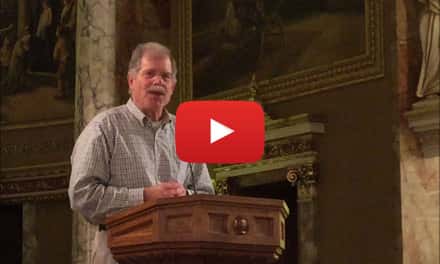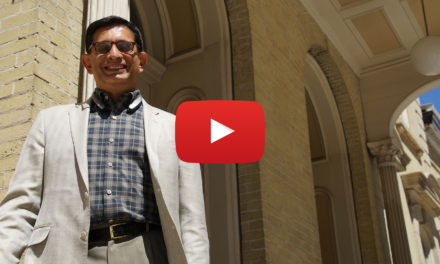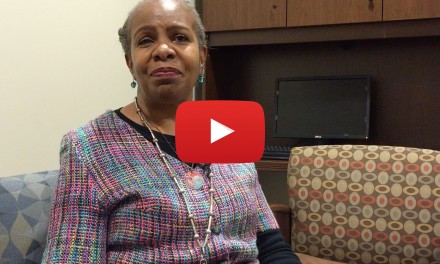Remarks by the President on the Healthy Communities Challenge, from his address at the United Community Center in Milwaukee, Wisconsin on March 3, 2016
THE PRESIDENT: Hello, Milwaukee! (Applause.) Oh, it’s good to be back in the Midwest! (Applause.) How is everybody doing today? (Applause.) You look great. It’s a balmy 25 degrees. (Laughter.) The last time I was here was —
AUDIENCE MEMBER: Obama!
THE PRESIDENT: I’m sorry — what? Oh, you were just saying my name. Okay, I thought somebody got sick or something. (Laughter.) And if you have a seat, go ahead and sit down. I’m going to be here for a while.
The last time I was here was for Laborfest a couple years back. (Applause.) Next time I think I should come for Summerfest. (Applause.) I hear it’s pretty fun.
There are some people I want to acknowledge who are here today — first of all, your outstanding Mayor, Tom Barrett, is here. (Applause.) County Executive Chris Abele is here. (Applause.) Your Congresswoman Gwen Moore is in the house. (Applause.) Thank you to everyone at the United Community Center for hosting us here today. (Applause.) And as a special treat, your own Milwaukee Bucks are in the house. (Applause.) These are some fine young men. And I told them that as long as they weren’t playing the Bulls I’d root for them. (Laughter.)
I want to say how much I appreciate Brent for sharing his story. Please give him a big round of applause. (Applause.) When I received his letter, it made a powerful impact for me because it was so honest about the fact that he wasn’t a supporter of mine — which is okay. I just bought him lunch and I think maybe — (laughter.) Of course, I’m term-limited, so there’s not much I can do now to get a vote. But we hugged it out. (Laughter.) But for him to be able to express not what only he’s going through personally, but also reflect on what that means for the rest of the country and the rest of Wisconsin is extraordinary.
We agree, Brent and I, that the Affordable Care Act is helping a whole lot of people like him. (Applause.) Brent is why we fought so hard to fix a broken health care system in the first place. It wasn’t about Democrats or Republicans. It was about our values as Americans, and making sure that hardworking Americans like Brent are no longer locked out of health insurance through no fault of their own. It was about the basic idea that in America, health care is not a privilege reserved for the few, but should be a right for all people. (Applause.)
In the six years since I signed the Affordable Care Act into law, millions of people have bought affordable health insurance — and many of those bought it for the first time. Last summer we learned that, for the first time ever, America’s uninsured rate has fallen below 10 percent. (Applause.) This is the lowest rate of uninsured that we’ve seen since we started keeping these records.
But we know that there are millions more who are eligible for coverage but haven’t gotten it yet. And that’s understandable. When you’re going about your day-to-day life — going to work, taking care of your kids — you’re not paying attention to enrollment deadlines. A lot of people still don’t know that most consumers can get covered for less than $100 a month — less than your cell phone bill or your cable bill. And obviously, there’s been a lot of political noise surrounding the Affordable Care Act, so people haven’t always known what’s true and what’s not.
So here’s what we did. We started a competition between 20 communities across America — from Philadelphia to Long Beach, from Atlanta to Denver — to see which city could get more of its uninsured neighbors to get covered. And I have to say that the folks who worked on this came up with some pretty clever ways to sign people up. In Seattle, folks held “health care happy hours.” (Laughter.) Now, that’s a pretty good trick right there. (Laughter.) In Nashville, they focused on music festivals. New Orleans created a challenge between barbershops and beauty salons. Oakland set up a health care storefront at city hall for folks to visit and shop in.
And I’m pretty proud of my own hometown. Chicago outperformed every other competitor — except one. (Applause.) Milwaukee came out on top. You get bragging rights this year. (Applause.) Bigger cities may have gotten more folks covered overall, but proportionally, relative to your size, you won out. All told, counting new folks and people renewing their coverage, you got nearly 90,000 people to sign up. (Applause.) That’s enough to fill Lambeau Field and still have a big tailgating party with a lot of folks outside. (Laughter.) And those tailgaters wouldn’t have to worry, because Obamacare covers indigestion from too many brats. (Laughter.) They’d be covered. (Laughter.)
So this city should be proud. You did the best job of looking out for each other and taking care of each other. And I’m here to say congratulations. And what’s remarkable is you did it by working together — elected officials, hospitals, clinics, insurers, faith leaders, community leaders, businesses, non-profits — everybody stepped up as a team.
And you guys tried everything. Mayor Barrett was out there handing flyers out himself — stuck flyers to people’s water bills — (laughter) — opened up libraries for enrollment events, set up a partnership with Uber to give folks a ride, covered buses in signs reminding people to sign up. Free clinics and health centers helped low-income residents enroll. Independent insurance agents even volunteered their time to help people choose the best option for them and their families.
And some folks were skeptical that insurance was just too expensive — so health care navigators used a cost calculator to help people figure out the most affordable plans.
You worked with TV stations to set up phone banks where viewers could call in, and volunteers would help them sign up for coverage. It turns out they got a lot of calls from moms who wanted to sign up their young adult sons — which, all of you all, listen to your mom. (Laughter.) She knows what’s going on. (Applause.) And let’s face it, men are just stupid sometimes. (Laughter.) Don’t go to a doctor, don’t get checkups.
And because some minority communities were less likely to have signed up, the county worked with the Black Healthcare Coalition to reach out to African Americans. (Applause.) They targeted the Hmong and Latino organizations with culturally appropriate materials, ran ads on Spanish-language radio, made sure folks with disabilities had the information they needed to sign up.
So the story to be told is one of just looking out for each other, just helping each other. This has been an incredible city and countywide effort — not just in this competition, but for years. And you’ve made Milwaukee a model for the nation, and you’re proof that the Affordable Care Act works.
Here’s another piece of proof. Today, I can announce that thanks to the law, 20 million more Americans now know the security of health insurance. Twenty million. Twenty million people. (Applause.) Twenty million folks like Brent. That includes 6 million young people, who were less likely to be insured before the Affordable Care Act.
As many as 129 million Americans with preexisting conditions can no longer be charged more or denied coverage just because they’ve been sick. Almost 140 million Americans who already have private insurance, so they didn’t need to sign up for Obamacare — they’re now guaranteed free preventive care as well, and checkups. Mammograms. You’re getting more for what you’re paying for.
So your insurance is better than it was — even if you don’t know it. Even if you didn’t vote for me. (Laughter.) Thanks, Obama. (Laughter and applause.) You got an upgrade.
And contrary to claims that this law would be a job killer, since I’ve signed it, we’ve seen steady economic recovery. Our businesses have created jobs every single month starting the month I signed the ACA into law — every month. (Applause.) Seventy-one straight months; 14 million new jobs; unemployment cut from 10 percent to 4.9. (Applause.) And because this law fills the gaps in employer-based care, we know that when we change jobs, or we lose a job, or we go back to school, or start that new business, we can still get coverage.
The point was not to replace the coverage that people had if they had a great job and they had great benefits. The idea was, things happen — you lose a job, you’re going to find another — but in the meantime you don’t want to lose your house. Somebody in your family gets sick unexpectedly, you want to make sure that they’re getting the best of care. That’s what insurance is. And the Affordable Care Act is saving lives — not just for folks like Brent, but also because the law is encouraging hospitals to focus on quality of care.
These are the kinds of things that — they don’t make headlines, but since we signed this law, we’ve seen a big drop in folks getting infections at hospital, and other improvements in hospital care. That leads to some 87,000 fewer deaths, and $20 billion in cost savings.
And the Affordable Care Act is saving money. Most folks shopping in the new marketplace have discovered that they can buy a plan for less than 75 bucks a month. Last year, 90,000 Wisconsin seniors on Medicare saved an average of more than $1,000 on their prescription drugs, thanks to the Affordable Care Act. (Applause.) And we’ve been moving Medicare toward a payment model that rewards quality of care over quantity of care. And that means we want doctors and hospitals to focus on giving folks the right tests and the right treatment, not just trying to sell more tests and sell more treatments. And that delivers better outcomes. We’ve just learned we’ve already hit our initial goal of getting 30 percent of Medicare payments into this new model that’s better for patients.
So the Affordable Care Act — aka Obamacare — (laughter) — is saving lives and it’s saving money. And we’ve done all this while creating millions of new jobs. We’ve cut our deficits by almost 75 percent. The act itself has cost less than the original projections. And meantime, health care price inflation is at its lowest level in 50 years. So even if you aren’t covered by Obamacare, your premiums or your employer’s premiums, or your share of premiums have increased at a slower rate over these last three years than they had in the previous 50. Which doesn’t mean that you’re not still seeing some increases, and you may not be happy about that, but understand that we’ve actually significantly reduced the pace at which it was going up.
And, look, you wouldn’t know any of this if you listened to the politicians on the other side out there about this who are obsessed with repealing this law. To them, the facts I just mentioned don’t matter, because this is an issue of ideology. This has to do with we just — “we’re just against it.” Facts, evidence don’t comport with their conviction that the ACA means an end to the American way. And “Repeal” has been a rallying cry. And they say they want to replace, but they still haven’t come up with a replacement — partly because we designed this plan with the help of a bunch of Republican thinkers, including the then-Governor of Massachusetts. This is the plan that they signed into law there.
Congressional Republicans have tried and failed to repeal or undermine it about 60 times. They’ve told you what they’d replace it with about zero times. (Laughter.) They sure won’t tell you what would happen if they actually did repeal it. If they got their way, 20 million people will have their insurance taken away from them. Twenty million people.
And, by the way, Milwaukee, while you worked your tails off to cover enough folks to fill Lambeau Field, your Governor still refuses to expand Medicaid in this state. And we could cover another 21,000 Wisconsinites with a stroke of his pen. He could join 31 other governors who are taking this option — which, by the way, actually would save money. He’s denying Wisconsinites their ticket to health insurance — and it’s political.
Your senior senator won’t tell you that if he gets his way, and repeals Obamacare, millions of working families would see their insurance premiums spike. The leader of the Republicans in Congress, who lives just south of here, won’t tell you that if he gets his way and repeals Obamacare, millions of women would go back to paying higher premiums just because they’re women. Millions of seniors would see the price of their prescription drugs shoot up.
Now, they’ll tell you, no, those are the goods parts — we keep those. Well, if you add it all up, that’s the Affordable Care Act. Why are you trying to repeal it? (Applause.) Why is it exactly that you’re trying to repeal?
This is an important point. See, people don’t know that, for example, kids being covered until they’re 26, or making sure that you can’t be discriminated against because of a preexisting condition, or making sure that women aren’t being discriminated against when it comes to health insurance, or free preventive care, or seniors getting reduced prices on their prescriptions drugs — they don’t know necessarily that those things are part of this law.
So when you ask Republicans about these things, they’ll say, well, yeah, those are okay — we just want to repeal the other parts. As I said, when you add it up, that’s the law. Why do you want to repeal it?
We can’t let that happen. It has been six years since I signed the Affordable Care Act into law. This is no longer just about a law. It’s not about me. It’s not about politics. This is about the reality that somebody like Brent goes through. I get letters every day, and people describe to me what it meant for them to have health care coverage. Now, if you’re healthy at the moment, you may not think about it. But at some point, each of us goes through times where things don’t work out that great, and you got to have a backup plan.
Once you get out of Washington, most Americans support the reality that they don’t want people not having coverage. The vast majority of folks like their coverage. The vast majority of folks are satisfied with their choices of doctors and hospitals. People like what we’ve done — the people who are actually using it. Not just the people who are hearing about it on Fox News, I’m talking about people who are actually using it.
For all the years of political fighting, all the repeal votes, all the predictions of apocalypse, the reality is that real people are finally getting insurance and having a bridge to stay insured as they go through various changes in their lives. That’s taking place in places like this, in Milwaukee — real communities looking out for each other.
Now, we are going to keep working to make health care work even better. There are things that I would love to work with the Republicans on in the closing months of my presidency to fine-tune this thing, and identify ways that we can improve quality even more and reduce prices even more. We could certainly get more folks covered who are currently being left out. We’ve got to keep working to get governors and state legislators to expand Medicaid and take care of their citizens. We’ve got to keep working to make prescription drugs more affordable.
But, Milwaukee, you have proved that what Americans care about most is not scoring political points — it’s looking after each another. You’ve made a difference in people’s lives. (Applause.) We’re not going backwards. We’re not going to go back to a time where people could be denied because of preexisting conditions. That’s not who we are. That’s who we were — that’s not who we are now. Americans know that.
Earlier today, I had lunch at the Engine Company with Brent and a few others who had written me letters. I get 10 letters ever night, I read them, keeps me connected to the people I’m supposed to be serving on a day-to-day basis. And one of the people who wrote to me was a woman name Karen George. A few years ago, while Karen was finishing her law degree, her husband was laid off for the second time in six years. The first time, they lost their health insurance, they had no choice but to get on what’s called COBRA. But as you know, that’s a really expensive transition plan, and they could barely afford it.
This time, they had the Affordable Care Act on their side.
By dinnertime, Karen had signed up her family for an affordable plan in the new health insurance marketplace. So she knew they were safe. They were protected. They were covered. And Karen said in her letter — she said, “When something like a layoff happens, you face a collection of moments of panic. To have one of those moments of panic go away was something. Right then, our health care was there when we needed it.”
Soon after that came another moment of panic. Just one week after graduating law school, Karen experienced chest pains — ended up in the ER with what turned out to be a heart problem. “Without this plan,” she wrote, “I probably would have tried to take a nap and wait for the pain to go away.” But instead, Karen got the care she needed. And Karen’s kids have their mom.
That’s because of your efforts. Because of you, America is moving closer to the day where every American family has that same peace of mind. So we got more work to do. But you’ve shown us that when ordinary citizens come together, as one family and one community, and roll up our sleeves, and look out for one another — that’s when change happens. That’s when we’re at our best. That’s how we’re going to keep building a country that lives up to its highest ideals. I could not be prouder. Congratulations. (Applause.)
God bless you, Milwaukee. God bless these United States of America. (Applause.)













